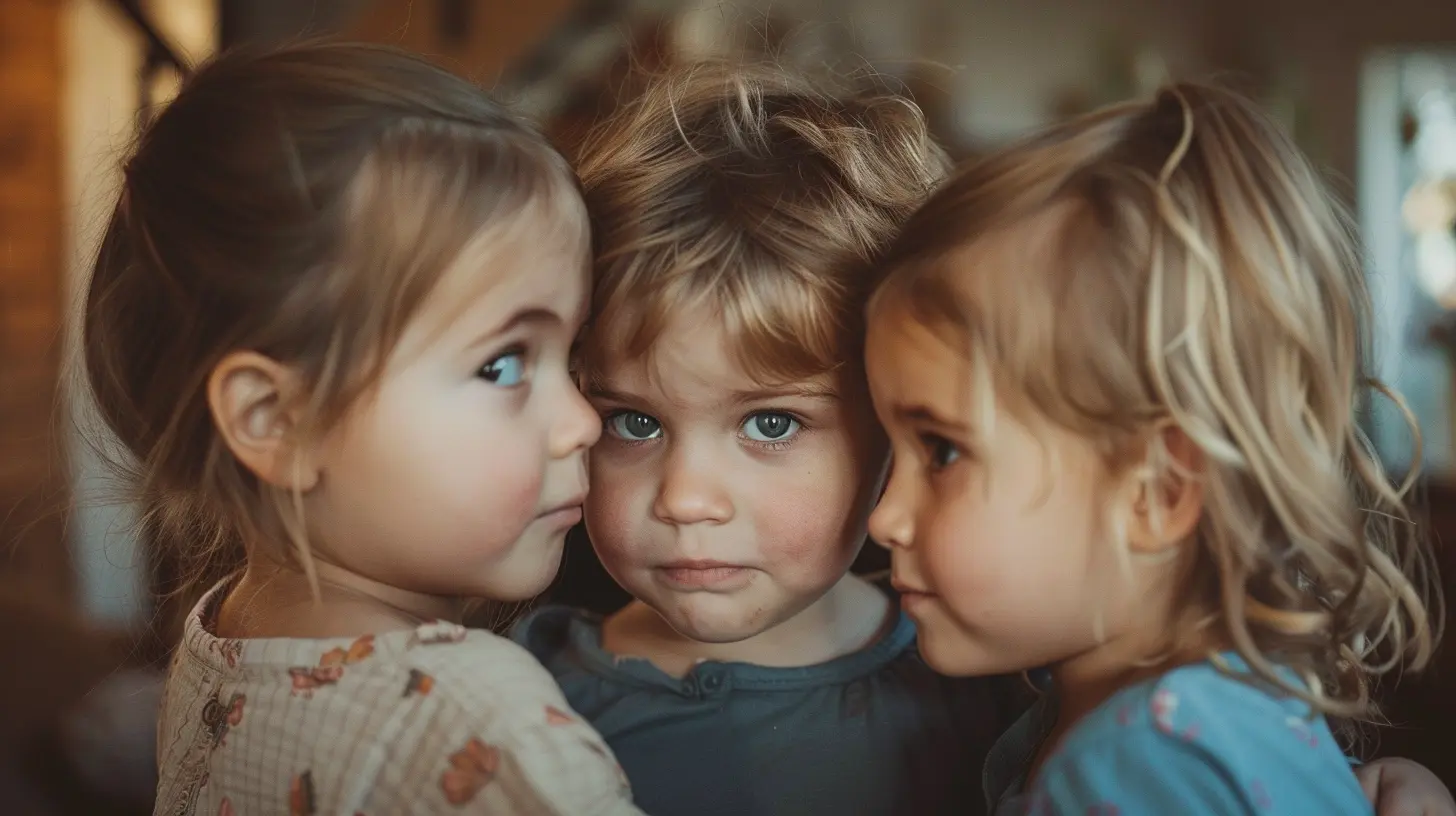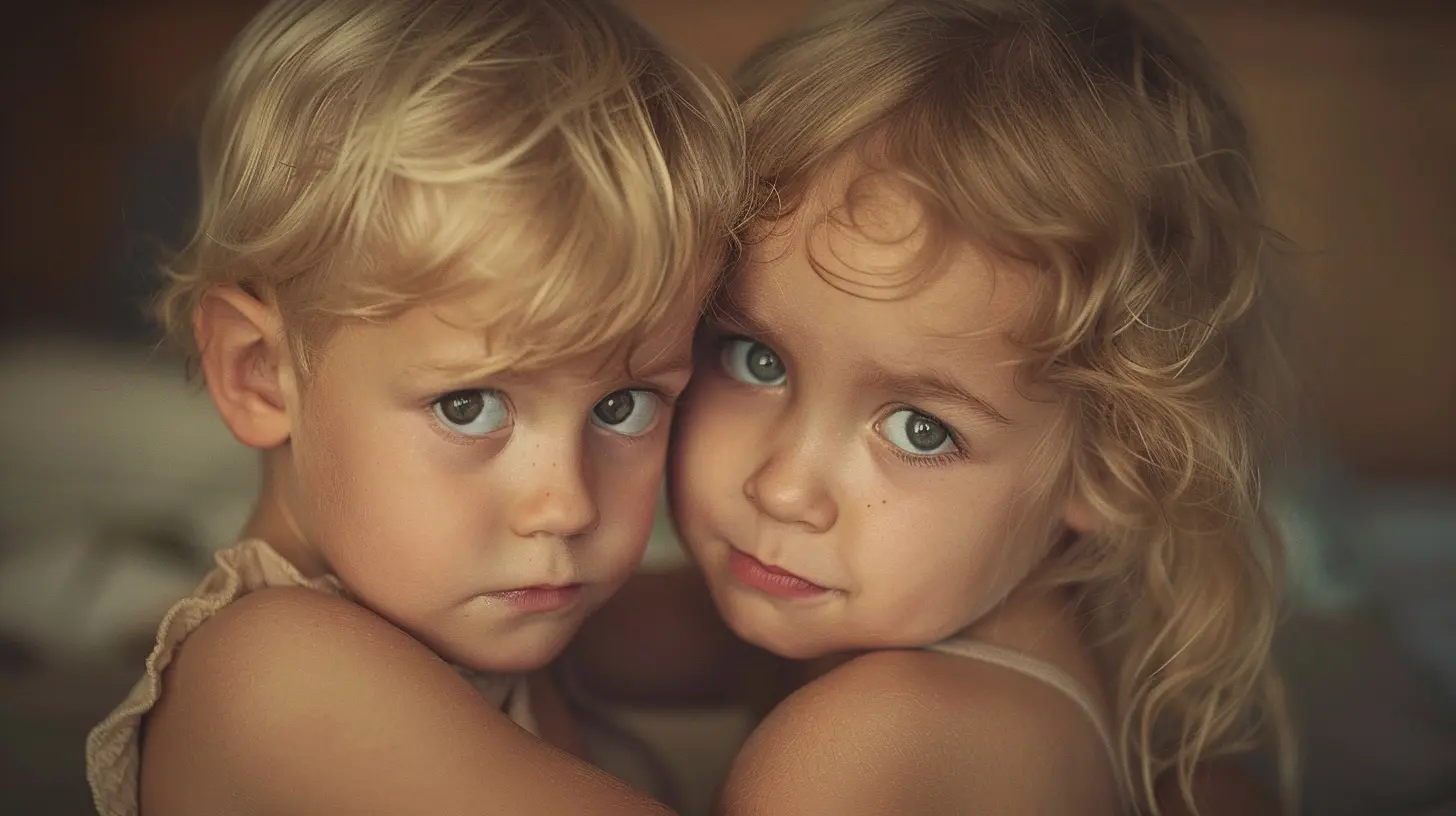How to Spot the Subtle Signs of Sibling Jealousy
2 August 2025
Let’s be honest, parenting more than one child is a beautiful journey… but sometimes, it feels like trying to juggle spaghetti. You’re balancing all the emotions, the love, the tantrums—and then, boom! One of your kids starts acting in a weirdly possessive or clingy way. You might think, “What’s gotten into them?” Well, that, my friend, might just be the sneaky shadow of sibling jealousy creeping in.
Sibling jealousy is totally natural. Think about it—your child was once the center of your whole universe, then along comes a new tiny human stealing the spotlight. Even if your kids adore each other most days, those small rivalry vibes can still bubble up under the surface.
So how do you know when it’s just a bad day or if jealousy is poking its head around? That's exactly what we're diving into today. Grab your coffee, and let’s chat about it!
What Exactly Is Sibling Jealousy?
Before we talk about spotting it, let's break down what sibling jealousy really is. It’s a mix of feelings—usually anger, sadness, or frustration—because one child thinks their sibling is getting more attention, love, or privileges.It doesn’t mean your kid is “bad.” Nope! It’s just their way of expressing big emotions in a small body. And it’s more common than you think. Yep, even in families where everything seems rainbows and unicorns.
Why Does It Happen?
Sibling jealousy can start at any age, but it’s especially common when:- A new baby is born
- One child gets praise or a reward the other doesn’t
- One sibling feels they have more rules or chores than the other
- Parents spend more time with one child (even if it’s for a good reason)
Let’s be real—our attention isn’t always split 50/50 (we’re humans, not robots). But from a child’s point of view, even the tiniest imbalance can feel HUGE.
The Subtle Signs: What to Watch For
Sibling jealousy doesn’t always show up with loud shouting matches or toy-grabbing battles. Sometimes, it's a lot sneakier. Here’s how to spot it:1. Over-Eagerness to "Help" with the Sibling
At first glance, it seems adorable. Your older child wants to help with diaper changes, feed the baby, or entertain their younger sibling. But pay attention—if the help seems forced or overly intense, it might be their way of saying, “Don’t forget about me!”They could be craving validation and trying to win your praise by being “the good one.”
Tip: Acknowledge their effort and thank them, but also make sure they’re not feeling like they have to parent their sibling to earn love.
2. Regression to Younger Behaviors
Was your potty-trained preschooler suddenly having accidents? Or your independent 6-year-old is now begging you to dress them? That can be a direct signal of jealousy.This kind of behavior regression is often a cry for the attention they see the younger child getting. It’s like they’re waving a flag saying, “Look at me! I’m little too!”
What to do: Stay calm, don’t call it out in a negative way. Offer gentle support and try to carve out some one-on-one time with them.
3. Excessive Boasting or Competing
If your child suddenly starts one-upping their sibling—“I can run faster!” “I draw better!”—they might be feeling less-than and trying to prove their worth.It’s a subtle way of seeking reassurance from you. They want to feel like the winner in your eyes, even in small things.
Encouragement tip: Celebrate each child’s individual strengths. Let them know their worth isn’t measured by comparison.
4. Deliberate Attention-Seeking
Picture this: You’re feeding the baby and your older child starts doing cartwheels in the kitchen, singing at the top of their lungs. It's cute, but the timing? Not a coincidence.When one child feels left out, they might act out just to get ANY reaction. Even negative attention feels better than none.
Be mindful: Try redirecting their energy in positive ways and reassure them that they’re still seen and loved, even when they’re not center stage.
5. Teasing or Passive-Aggressive Behavior
This one’s subtle but pretty telling. Maybe your older child starts making “jokes” at their sibling’s expense. Or they give backhanded compliments like, “Good job, for a baby.”While it may seem harmless, these remarks can be tiny windows into their inner jealousy.
What helps: Talk to them privately. Avoid scolding right away—instead, ask how they’re feeling. You’ll probably uncover deeper emotions under the surface.
6. Over-Emotional Reactions
Ever notice your child overreacting to even small things their sibling does? Like breaking down in tears because their brother used their cup?Yep—that’s not really about the cup. It’s about all the bottled-up emotions finally bubbling over.
Jealousy isn’t just aggressive—it can be reactive too.
Try this: Create a safe space for them to talk. Ask open-ended questions like, “Is something bothering you lately?” Timing is key—don’t ask in the heat of the moment.
7. Mystery Aches and Illnesses
“My tummy hurts,” or “I don’t feel good,” right when the baby is being cuddled or you’re setting up a game for the other sibling? Red flag.Children might express emotional distress through physical complaints because they’re not sure how else to voice what they’re going through.
Solution: Show empathy but also see if there’s a pattern. If the complaints often follow moments when another sibling gets attention, you’ve likely found a clue.
How to Help Your Kids Navigate Jealousy
Okay, so now that you’re a pro at spotting the signs, how can you ease the rivalry and bring a little more harmony back into your home?1. Validate Their Feelings
Let your child know it’s okay to feel jealous. Avoid saying things like, “Don’t be silly!” Instead, try, “It’s tough when it feels like someone’s getting more attention, huh?”Showing that you understand their emotions can be more comforting than trying to ‘fix’ them right away.
2. Set Aside One-on-One Time
Even just 10-15 minutes of focused, uninterrupted time with each child can go a long way. It tells them, “You matter to me, just as you are.”Let them choose the activity. Read their favorite book, build blocks, or just sit and chat.
3. Avoid Comparisons
We all do it sometimes without realizing: “Why can’t you be more like your sister?” Oof. Those words can sting.Instead, focus on individual traits. “I love how curious you are,” or “Your drawings are always so creative!”
Comparison is the thief of joy—for kids too.
4. Create Team Moments
Encourage sibling bonding without pressure. Get them to work together on a craft, build a pillow fort, or bake cookies using teamwork.Shared accomplishments help build positive associations with each other.
5. Highlight Each Child’s Uniqueness
Make it clear that love isn’t pie—one slice for one kid doesn’t mean less for the other. Tell each child what you love about them individually.“You’re my sunshine when I’m tired,” or “You make me laugh like no one else!” Those little affirmations stick.
6. Involve Them in Roles Without Burdening
Include your older child in caring for the younger one—but only lightly. Don’t turn them into a mini-parent. Ask them to be your helper but praise them separately for being themselves.When to Seek Extra Help
Sometimes, sibling jealousy moves beyond the everyday bickering and enters risky territory—like bullying, constant aggression, or long periods of withdrawal. If you notice those signs, it could be time to talk to a child therapist or counselor.There’s zero shame in that. Parenting is hard, and asking for support is actually one of the strongest things you can do.
Final Thoughts
Sibling jealousy is like the background music in many households—it’s always playing softly, even if you don’t hear it right away. But with a little intention, empathy, and cups of patience (lots of coffee helps too!), you can dial down the drama and turn up the connection.Just remember: jealousy isn’t a sign of failure—it's a sign that your child feels deeply. And that, with love, guidance, and a few giggles along the way, can be the start of even stronger sibling bonds.
all images in this post were generated using AI tools
Category:
Sibling JealousyAuthor:

Austin Wilcox
Discussion
rate this article
1 comments
Rivenheart McFarlin
Navigating sibling jealousy requires both patience and awareness. By fostering open communication and validating each child’s feelings, parents can create a supportive environment. Remember, healthy sibling relationships often thrive on understanding and empathy, so encouraging collaboration can transform jealousy into companionship, laying the foundation for lifelong bonds.
August 23, 2025 at 2:52 PM

Austin Wilcox
Absolutely! Encouraging open communication and empathy can effectively transform sibling jealousy into stronger bonds. Great insights!


